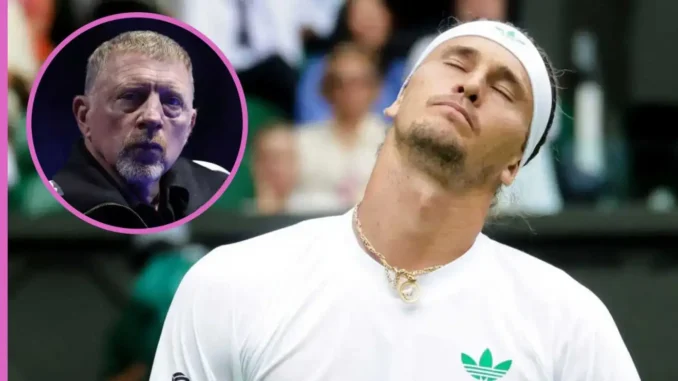
The tennis world was left reeling after Alexander Zverev’s unexpected first-round exit at Wimbledon 2025, but it was the German star’s raw, emotional post-match press conference that struck a deeper chord, bringing even tennis legend Boris Becker to tears. The world No. 3, stunned by a five-set defeat to world No. 72 Arthur Rinderknech on July 1, 2025, bared his soul, admitting to profound mental health struggles that have left him feeling “empty” and devoid of joy. Becker, a three-time Wimbledon champion and mentor to Zverev, described the moment as “incredibly sad,” urging the 28-year-old to prioritize his well-being over his tennis career as he navigates this personal crisis.
Zverev’s 6-7(3), 7-6(8), 3-6, 7-6(5), 4-6 loss to Rinderknech on Centre Court marked a low point in a season already marred by challenges. After reaching the Australian Open final in January, where he fell to Jannik Sinner in straight sets, Zverev struggled to regain his spark, suffering what he described as a “burnout” mid-season. “I didn’t give myself, my body and my mind time to accept what happened,” he had said earlier, reflecting on the toll of that defeat. His Wimbledon press conference laid bare the depth of his struggles, as he admitted, “I’ve never felt this empty before. Just lacking joy, just lacking joy in everything that I do. It’s not necessarily about tennis. Just lacking joy outside of tennis, as well.” For the first time, Zverev hinted at seeking professional help, saying, “Maybe for the first time in my life I’ll probably need it.”
Becker, watching the press conference live, was overcome with emotion. “I watched the press conference live and I cried,” he revealed on his podcast with Andrea Petkovic. “A person opened up and said, ‘I have problems, I have mental problems, help me. I don’t have anyone around me except my daughter, who is four years old, with whom I like to spend time, where I laugh and smile.’” The 57-year-old, who has long viewed Zverev as his “sporting protégé,” immediately reached out, receiving a thumbs-up emoji in response, a small sign that Zverev was coping. “I have never seen him so honest, he basically revealed himself, let his emotions simmer and I found it incredibly sad,” Becker added, expressing concern not just for Zverev the player, but for “the person Sascha Zverev.”
The tennis icon’s worry extended beyond the court, as he emphasized the long-term implications of Zverev’s mental health. “Tennis, he can play, he’ll win tournaments, he’ll lose a few, but how is he doing personally?” Becker asked. “And that’s a very important point for the rest of your life, because at some point your career will be over and it will be great. But how are you then? How are you as a person? What is your environment?” With Zverev currently in Ibiza, taking time to “let his soul tree,” Becker pleaded with him to skip the upcoming Swiss Open in Gstaad, scheduled for mid-July. “My advice would be please, please, please, don’t play Gstaad,” he urged. “Take your girlfriend Sophia, go, you have a lot of money. Rent a boat, sail around the Aegean, do some island-hopping, but please come back to yourself as a person so you have the strength to succeed on the tennis court again.”
Becker’s concern was compounded by his critique of Zverev’s support system, particularly his brother and manager, Mischa Zverev. He described Mischa’s role as “strange,” noting that as a TV analyst for Amazon Prime, Mischa appeared “almost emotionless” when discussing his brother’s loss, stating, “He lost a match, takes a few days off, and then Gstaad is on the schedule.” Becker argued that Mischa’s multiple roles—brother, manager, and commentator—created a conflict, saying, “He has so many roles. On one hand, he must be a brother and care for his younger sibling. On the other, he’s a TV expert who must speak credibly but can’t criticize his brother.” This echoed Becker’s earlier advice after Zverev’s French Open quarterfinal loss to Novak Djokovic, where he suggested Zverev part ways with his father and brother as coaches, a comment that sparked a sharp rebuttal from Zverev.
Despite their past tensions, Becker’s empathy for Zverev underscores their deep bond. Zverev, who plans a four-week break before the Masters 1000 event in Toronto, has acknowledged his need for change. “I’ve been through a lot of difficulties in the media. I’ve been through a lot of difficulties in life, generally,” he said, hinting at off-court pressures. As he seeks to rediscover his joy, the tennis community, led by voices like Becker and Novak Djokovic—who offered support, saying, “If he needs me, I’m here”—rallies behind him. Zverev’s candidness has sparked a broader conversation about mental health in sports, with his vulnerability serving as a powerful reminder that even the world’s best athletes are human, grappling with challenges that transcend the court.
Leave a Reply